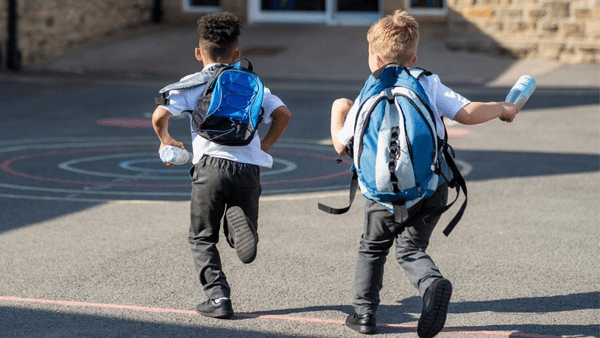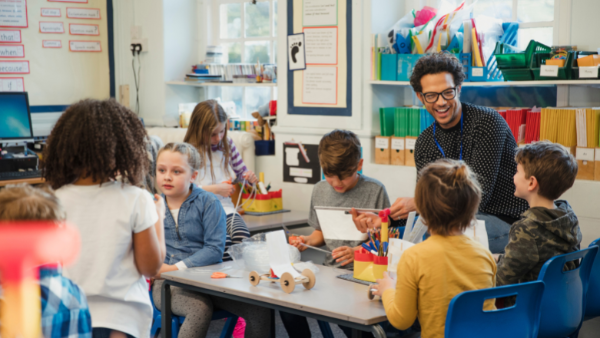How do people feel about primary schools re-opening to pupils in Reception, Year 1 and Year 6?
Before many English primaries opened this week, the RSA and Populus asked adults across the country their views on government plans for re-openings and education after Covid. (Full polling data)
We found a third of adults didn’t think schools should open in June at all. Criticism of the government’s approach was even stronger among Black, Asian and Minority Ethnic participants and people from the poorest backgrounds (social grade DE).
We need to listen to their concerns. This is the time to improve social and emotional support for children at school and make education after Covid fairer than it was before.
“Schools should not re-open in June”
Over a third of UK adults agreed with this statement. Sentiment was even stronger among non-White respondents, with 44% of them agreeing.
In fact, a third of non-White respondents agreed that “schools should only reopen when a vaccine for COVID19 has been found”. This is perhaps unsurprising considering what we know about the disproportionate impact of the virus on those in Black, Asian and Minority Ethnic groups.
A new Public Health England report published this week confirms that Black people are most likely to be diagnosed with the virus and that deaths are highest among those from Black and Asian ethnic groups.
Even when controlling for other factors such as age, sex and deprivation, people of Bangladeshi ethnicity face double the risk of death of White British ethnicity. Other minority ethnic groups face a 10-50% higher risk.
Therefore, it is entirely understandable that these families might shield or self-isolate themselves and resist returning their children to school until they receive reassurances that it will be safe.
Responses to our poll reveal a lack of trust in the government to plan in the best interests of children, which may be at the root of low confidence in the safety of school re-openings.
Again, this was higher for respondents from ethnic minority groups. 63% of non-White adults said that they do not trust the government to have the best interests of children at heart when it comes to re-openings, compared with 48% of White respondents.
In our survey, only 15% of Black adults said they did trust the government to have the best interests of children at heart when making decisions about school re-openings. However, the sample is very small once broken down and therefore these results are not entirely reliable. This is why we are comparing White and non-White responses, though we acknowledge the limitations of grouping all ethnic minority respondents in that way.
Disadvantaged families are less likely to want to send their children back to school
There has been widespread concern about the negative impact of school closures on pupil progress, especially for the most disadvantaged pupils.
These pupils ordinarily have poorer educational outcomes than their peers and research shows that this gap widens during periods when schools are closed such as the summer holidays. This could be for many reasons including the availability of learning resources in the home and opportunities to go on educational trips.
Concern about ‘learning loss’ for disadvantaged pupils creates a strong rationale to get them back to school as soon as possible. But their families may not feel confident about sending them back.
We already know that despite children of key workers and those considered vulnerable having a right to attend school during closures, no more than 15% of those pupils have attended.
Our survey asked UK adults their views on phasing return to school by vulnerability, with those eligible for free school meals and with special educational needs going back first (alongside key workers’ children). Only 13% of those from the lowest socio-economic backgrounds welcomed this approach.
Could this mean that those parents are most likely to keep their children home as schools gradually re-open?
That certainly is the indication from recent NFER research, which found that senior leaders in schools serving high numbers of disadvantaged pupils predict that a higher proportion of their families will continue to keep their children home. Indeed, those schools had already experienced a drop-off in attendance between the outbreak of Covid-19 in England and the official closure of schools.
If disadvantaged families are less likely to want to send their children back to school, what support do they think would be most helpful for learning at home? We asked them. Poll participants could select up to three options from a list of seven.
The most popular options among adults from the lowest socio-economic groups were:
- ‘social and emotional support for pupils who have struggled with lockdown’ (49%)
- ‘increased provision of lessons on widely available TV channels as well as online’ (46%).
There were some differences in opinion between groups. For example, the most popular option among non-White respondents was ‘providing summer schools with a focus on ‘catch-up’ and ‘skills in using computers/ technology’ (51%), with social and emotional support in second place (49%).
How can we deal with concerns about children returning to school?
Our poll results underline a simple fact. Social and emotional support for children will need to be prioritised if they are to recover from the lockdown.
Mental health is being tested under lockdown with children missing their friends and facing anxiety about the impact of school closures on their futures. Things will be even harder for the most disadvantaged children especially those in small, overcrowded homes, whose families face unemployment or where conflict is common at home or in the community.
The RSA doesn’t believe schools can meet the challenge of supporting children’s emotional recovery alone. We want to support the creation of collaborative communities of professionals from different disciplines who have the time and resources available to work together to meet every child’s needs. They will work closely with families and young people to create a support system that the whole community feels ownership of.
What we do believe is that times of crisis can be an opportunity for positive change. We are working on ideas to make education after Covid-19 fairer than it was before. More emotional support is an idea that parents support, and can help us move towards that goal.
Join our community and help shape change in a post-covid world.
Related articles
-
What are educators’ experiences supporting youth social action?
Hannah Breeze
We asked 2,000 primary educators to share their attitudes, motivations and the potential benefits of delivering youth social action in the classroom.
-
RSA Design Awards: A celebration of design
Aoife O'Doherty
We recently Celebrated the winners of the Student Design Awards and the Pupil Design Awards 2022, at our ‘Designing our futures’ event. Learn about our awardees and their innovative designs.
-
Youth social action and the experience of primary educators
Hannah Breeze
Contribute to our Third Benefit research to understand how involving primary school teachers in high-quality youth social action can inform benefits for them as well as pupils and communities.





Be the first to write a comment
Comments
Please login to post a comment or reply
Don't have an account? Click here to register.